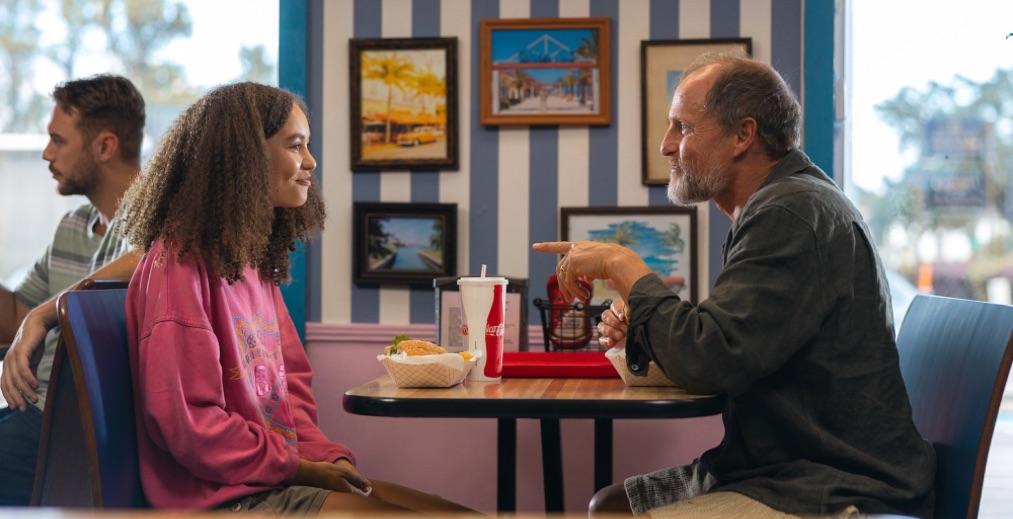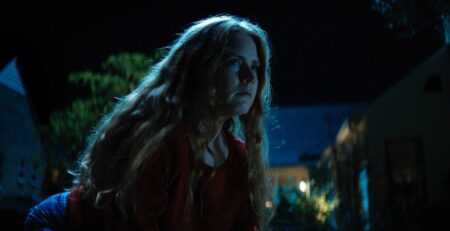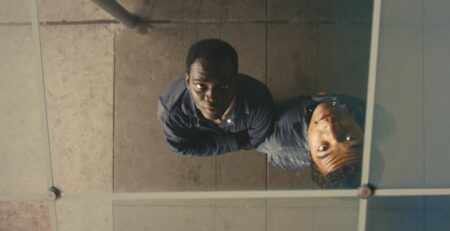Laura Chinn’s coming-of-age drama and directorial debut, Suncoast, offers a deeply personal exploration of family, death, and adolescence. Premiering at the Sundance Film Festival and now streaming on Hulu, the film is captivating with its compelling narrative and stellar performances from Laura Linney, Nico Parker, and Woody Harrelson.
Laura Chinn‘s screenplay draws inspiration from her own life experiences, weaving together a story that resonates with authenticity and emotional depth. Set against the backdrop of Florida in the early 2000s, the film follows Doris, a teenager grappling with the challenges of caring for her terminally ill brother. This while navigating the complexities of adolescence. Thankfully, the 2000s setting doesn’t focus on the nostalgia of the time but rather the intensity of the story Chinn is trying to portray.
At the heart of the story is Doris’s (Nico Parker) relationship with her audacious mother, Kristine (Laura Linney), who is clearly distraught by her son Nate’s terminal condition. As Doris shoulders the responsibility of caring for Nate (Amarr), who is blind, mute, and battling brain cancer, she also contends with her mother’s emotional turmoil and the looming specter of death. The strained dynamics between mother and daughter, heightened by their dire financial circumstances, form the emotional core of the film.
Against this backdrop, Chinn fearlessly explores the daily struggles and surreal experiences that define Doris’s teenage years. From navigating a private Christian school to grappling with the relentless news coverage of Terri Schiavo’s controversial medical case, Doris finds herself thrust into a world filled with moral and ethical dilemmas. The film deftly juxtaposes Doris’s mundane high school existence that she desperately craves with the heightened reality of the hospice where her brother resides, creating a poignant contrast that underscores the gravity of their situation.

Central to Doris’s journey is her unlikely friendship with Paul Warren (Woody Harrelson), an eccentric activist who protests the medical case surrounding Terri Schiavo. Paul, who lost his wife suddenly and believes fervently in the sanctity of life, becomes a confidant and mentor to Doris. He engages her in thought-provoking discussions about ethics and morality. Unlike her classmates, Paul gets it. Their bond serves as a source of solace and guidance for Doris amidst the turmoil of her everyday life. It offers her a glimpse of hope and understanding amid the chaos.
As Doris grapples with the weight of her responsibilities, she finds herself seeking refuge in teenage rebellion and escapism. Her decision to throw a hurricane party while her mother is away with Nate at the hospice facility reflects her desire for normalcy and social acceptance amidst her family’s struggle. However, as she begins to realize that she is not living a normal teenage life like her peers, Doris confronts the harsh realities of her situation and the consequences of her actions.
Navigating high school while being a caregiver to an ill family member is inherently difficult. Suncoast accentuates the heightened stress and unease, especially given the family’s financial struggles. Doris’s private school peers enjoy financial reprieves that remain out of reach for her, emphasizing the disparity in their experiences. To their credit, Doris’s classmates are sympathetic and welcoming, subverting the mean girl motif prominent in the 2000s. However, the film contrasts Doris’s unique struggles with the seemingly inconsequential high school problems of her privileged peers. Even as Doris makes friends, she is still very much alone.
At its core, Suncoast is a testament to the power of empathy and understanding in the face of adversity. Kristine strives to provide a better life for her daughter, sending her to private school despite financial constraints, necessitating a serving job to fund private school and Nate’s medical care. While brash and short-tempered, I couldn’t help be see my mother in Kristine. I recall my own mother’s challenges, understanding the immense pressure she faced while managing a family at a young age and later with her own mother’s illness. Despite being labeled a monster in the film, it’s evident that Kristine grapples with heartbreak as she witnesses one son slipping away and her daughter distancing due to her actions, even as she endeavors to offer the best she can.

For Doris, it’s clear that under different circumstances, she could lead a normal life like her private school peers. Unfortunately, that’s not the case. Whether she likes it or not, Doris has to grow up fast. Her life isn’t ordinary and teenage antics won’t change that. The understandable resentment surfaces in her acting out. However, when high school ends, she’ll still carry the pain of a broken family. Before the credits roll on Suncoast, Doris realizes running or bottling it in won’t mend it, but support from your loved ones can help. The message serves as a reminder to any of us who had to become an adult before we were ready.
Moreover, as protestors line the walkway into the hospice facility, Suncoast acknowledges that political activism doesn’t alleviate the struggles faced by individuals like Kristine and Doris. Virtue signaling and discussions of ethics hold little meaning for those directly dealing with such circumstances. When tragedy strikes, Kristine and Doris are left alone. This emphasizes that no amount of philosophical discussions or candlelight marches can lessen the profound pain they experience. Suncoast serves as a poignant reminder to consider the individual situation before assuming understanding. It’s here the film succeeds in highlighting the stark disparity between activism and the raw reality faced by those immersed in personal turmoil.
Suncoast is a profoundly moving and emotionally resonant film that offers a compelling glimpse into the human experience. Laura Chinn’s directorial debut is a triumph of storytelling. It weaves together a rich tapestry of emotions and experiences that linger long after the credits roll. With its stellar performances, thought-provoking themes, and heartfelt storytelling, Suncoast is a must-watch for anyone who has dealt with loss.
Suncoast is streaming now on Hulu.
Suncoast
-
Rating - 9/109/10
TL;DR
Suncoast is a profoundly moving and emotionally resonant film that offers a compelling glimpse into the human experience. Laura Chinn’s directorial debut is a triumph of storytelling, weaving together a rich tapestry of emotions and experiences that linger long after the credits roll.





